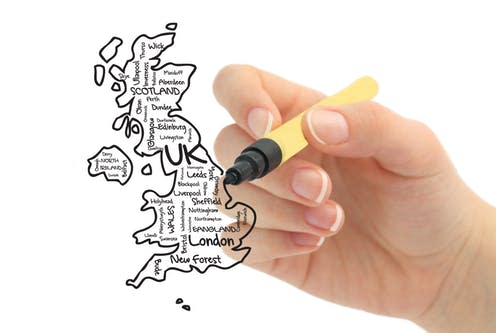Brexit: this poll reveals a sad truth about Britain and Northern Ireland

Recent polling from Conservative peer Michael Ashcroft suggests that two-thirds of pro-Brexit voters would rather leave the Customs Union than avoid a hard border in Northern Ireland, and that six out of ten people surveyed “would not mind either way” if Northern Ireland voted to leave the UK.
This shouldn’t actually come as a great surprise. While not frequently acknowledged by those on the Remain side of the argument, Brexiteers believe passionately in their project. It’s easy to deride such people for being duped by the simplistic slogans and promises of the Leave campaign but that underestimates both their argument and their determination to see it through.
The hope that they will “come to their senses” once the full implications of the UK’s decision to leave the EU are recognised is most likely a forlorn one. These people are frustrated, anxious and increasingly bitter about what they see as an attempt to undermine the Brexit negotiations and thwart the process of the UK leaving the EU. The shrill invective that can be seen on social media, where Irish politicians have been accused of “weaponising” the debate on Brexit, is in part driven by a concern that their Brexit dreams may be dashed.
But there is little evidence that their strength of feeling has lessened as a result of the political incompetence of the UK government and its negotiating team over the past 18 months. Nor is it affected by the fact that indicators from credible sources suggest the UK is heading for a disastrous economic outcome. Brexiteers are determined it seems, reminiscent of Alfred Lord Tennyson’s Charge of the Light Brigade, to keep “Charging an army while all the world wondered”.
In this context – and for those who do not live ther – the spectre of a hard border in Northern Ireland may be a price worth paying to keep the Brexit project on the rails.
A place apart
But there is another explanation for Ashcroft’s poll finding. This is less flattering, not just with respect to Leave voters – but for the country as a whole. It reflects a belief about the union of Great Britain and Northern Ireland. It is Team GB you see flying the flag at the Olympics –- not Team UK, despite the fact that Northern Ireland competes under that flag – and what goes on in the Olympics mirrors a broader public consciousness of the “nation”. Northern Ireland’s invisibility in sport is a painful metaphor for those of a unionist persuasion. Put bluntly, Northern Ireland is different. It exists on the political, economic and cultural periphery of the UK, rather than being an integral component of Britain’s understanding of its own self-interest or self-image.
The phrase Britain has “no selfish strategic or economic interest” in Northern Ireland, was one of the golden keys that unlocked peace in Northern Ireland and was a key mantra of the Good Friday Agreement in 1998. The British government has never said this about Scotland, Wales or any other part of the UK. It is hurtful to unionists who feel that Britain should have a selfish interest in Northern Ireland. But it doesn’t and it is unlikely that it ever will.
Team GB’s politicians have frequently demonstrated their willingness to consider all options in private, regardless of what they may say in public –- so we should not be surprised if public opinion follows suit. Churchill and Thatcher both reportedly considered dumping Northern Ireland at moments of political expediency.
Churchill contemplated trading it for the support of the Irish Free State in World War II and made a number of overtures on this basis to the Irish taoiseach of the time, Eamon de Valera. In 1983 meanwhile, Margaret Thatcher asked the then Northern Ireland secretary James Prior if he thought her government should prepare for a “tactical withdrawal” from Northern Ireland. She signed the Anglo-Irish Agreement two years later, which gave the Irish government a consultative role over key policy decisions in the North. It was a massive blow to the unionist psyche, but their feelings were less important to Thatcher than a potential alliance with Dublin and improved diplomatic relations with America.
Despite the popular adage often attributed to Thatcher, that Northern Ireland was “as British as Finchley”, (her former constituency), in practice it never has been. When it comes to Northern Ireland, different rules apply. It’s Team GB first and “Team GB and Northern Ireland”, a distant second.
It’s not surprising that polling today over Brexit demonstrates that at this latest moment of national upheaval, Northern Ireland is still seen as politically expendable by Team GB.
This article was originally published on The Conversation. Read the original article.

Feargal Cochrane does not work for, consult, own shares in or receive funding from any company or organisation that would benefit from this article, and has disclosed no relevant affiliations beyond their academic appointment.

 Yahoo Sport
Yahoo Sport 





































